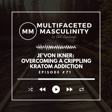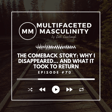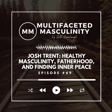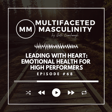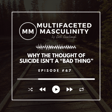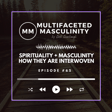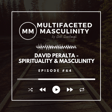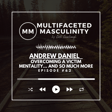Become a Creator today!Start creating today - Share your story with the world!
Start for free
00:00:00
00:00:01

"The Social Dilemma" Highlights Nazi Germany Patterns of Unhealthy Masculinity | Ep #34
The fact that Social Media and "screen time" creates a damaging internal ripple effect is nothing new. What's different about The Social Dilemma is the message is coming directly from the very people who created the services we are so addicted to today.
I'd highly recommend you stop and watch the documentary if you haven't already.
Today we cover:
- Ways to reconnect to your strength, truth, and internal compass in a time when everyone is feeling lost.
- Ways you can adjust your relationship with software/websites options available today.
- The similarities of 1930's Germany and where the US is today.
- The ways Germany slowly eroded the humanity of certain people and molded their society to tolerate more and more hate.
- How hard it was to take a stand against the wrongs then and how it's still hard today.
- What "taking a stand" looks like practically.
URL's
Host: JoshCearbaugh.com
Podcast: MultifacetedMasculinity.com
12 Week Course: Jumpstartyourlife.com
Free 15 Minute Consultation: Click Here
Netflix Documentary: The Social Dilemma
MM Episode: How to Passionately Disagree and Strengthen a Relationship
Transcript
Exploring Masculinity
00:00:00
Speaker
Men, we are not simple, chest-thumping, rock-smashing, fire-starting barbarians. We have depth. We intensely feel. We are scared, yet brave. We love to have fun. We're imperfect and make mistakes. We're compassionate and loving. We are multifaceted. Let's explore the reality of masculinity together.
00:00:29
Speaker
If we don't study history, we are doomed to repeat it. That's been well known for years. And yet we still tend to do that for some reason.
The Social Dilemma's Insights
00:00:40
Speaker
And it was really interesting watching the social dilemma. It's a new documentary on Netflix. It's really popular right now, popular for good reason, because I think it puts an explanation and words to what a lot of us are experiencing. If you haven't watched it, I highly recommend it.
00:00:59
Speaker
But the premise of it is basically a lot of the people who helped form, whether it's email or Twitter or the like button on Facebook, those different things are the very people that are in this.
00:01:11
Speaker
documentary that are talking about the destructive nature of it. Not that that was their intent, but where we have arrived today with everything that's been implemented and deployed. And I am a digital marketer and so I understand to a degree, but even with my understanding, it was really eyeopening to watch that movie. One of the biggest things that I took away from it was
00:01:36
Speaker
the similarities between the last 10 years and really Germany in the 1930s. And so today we're gonna dive into related to masculinity, to who you are as a man, quote unquote standing up against what is happening before us. What does that look like? Would you be able to do
Societal Trends and Masculinity
00:01:57
Speaker
that? What does it look like to take a stance? Where are the areas that we are headed in the wrong direction and can we do anything about it?
00:02:05
Speaker
So we dive into all of that today. And if you haven't already, I'd ask that you pause and go ahead and subscribe or leave a review. They really do mean a lot to me. As I say over and over again, just because we are still young, this podcast is still forming and your feedback, your response and you subscribing helps me understand where to shape this conversation of masculinity. So let's go ahead and dive into
00:02:36
Speaker
My thoughts on the social dilemma and how the parallels between what they went into and Germany in the 1930s have to do with one another.
Social Media's Impact on Life
00:02:58
Speaker
Let me ask you a question. Do you think that if you were in Germany in the late 1930s, that you would have become a Nazi? Now, that might be a random question to ask yourself, but I think it's really important to look at what led to that society getting to the point that it did and some really hard pills that we as men need to swallow
00:03:27
Speaker
in the sense of reality that we are currently sitting in today. Because if you said, no, I probably wouldn't, I don't think that I would have stood up against whatever it may be that the Nazis did to get to the point they did. Well, that's probably like a pretty honest answer, because if you're going, no, there's just no way, Josh, I would not have done that.
00:03:56
Speaker
Statistically, you probably would. We have stories and movies about the people that were brave enough to do something about it. And the reason that we have those is because they weren't very common. They stood out from the crowd. And the crowd slowly adapted to get to the point to where they did in the sense of World War II.
00:04:21
Speaker
Now, if you say that, yeah, Josh, but I hear you, but I'm one of the people that would have actually stood up. I would have been the man that protected my family and did what I needed to do. Okay, that's fair. Let me ask you a really simple question. How prevalent are electronics in your home? How much time do you spend on YouTube and Twitter and Facebook and Instagram and TikTok? All of those different outlets.
00:04:50
Speaker
How much time do you currently spend on them in a day or in a week? How much of your family life revolves around those? Because if you are someone who goes, you know what, we don't have, we only have flip phones and we don't have any social media. Guess what? You would have been one of the ones that were more likely to stand up against what was happening in Nazi Germany.
00:05:21
Speaker
Now you might be saying, Josh, that's a really extreme comparison. World War II versus social media today. And I would argue not so much. A lot of what has provoked this in me is the new movie that came out on Netflix, The Social Dilemma.
Social Media Paradox
00:05:44
Speaker
And you might even go as far as to say, you know what, Josh, you are
00:05:50
Speaker
a hypocrite in and of yourself. You are promoting your stuff on social media. You have a YouTube channel. You have a podcast. You're literally using the very things that you are saying are like Nazi Germany in the 1930s. And a couple of things with that.
00:06:08
Speaker
First is I would say, yeah, you're not wrong. I am using those things. I have gotten sucked into that, not to the degree that maybe some others have, but to the degree that it's affected me totally. And the social dilemma, the movie was really eye opening for me. It caused me to pause and think about how much am I getting sucked into the very things that they're talking about?
00:06:37
Speaker
I think when you have individuals that clearly understand the psychological implications of the software that they are developing or the apps that they're developing, and yet even those people can't put down their phones and be present, that says something.
00:06:59
Speaker
It says that no matter how much you think you can overcome it, it's really freaking hard to do something different than what you've just kind of inadvertently fallen into. And so, yeah, I totally am guilty of using social media to build my brand. Am I going to stop doing that? Honestly, probably not. But am I going to adjust?
00:07:23
Speaker
my lens on the reality of what those social outlets are doing to both me, to my kids, to my friends, to my family, fundamentally change the relationship that I have with those? Yeah, I think so. Because right now, we have gotten to a place where people don't know what's true.
00:07:48
Speaker
People don't know who to turn to to fact check or to find a reliable source of
Finding Personal Truth
00:07:56
Speaker
truth. And yet, at the very same time, in the midst of all of that going on, what's a common phrase that you hear, at least that I hear often is, I'm just speaking my truth. I'm finding my truth. I don't think there's anything wrong with that, but why do you think it is that so many people are trying to find their truth?
00:08:19
Speaker
and share it. It's probably because they can't find truth anywhere else. And in that sense, there may be actually some good that have come from the chaos that social media has brought because it's caused us to look at how dysfunctional it is for us to create an alternate life online. I think it's important for you to see social media for what it is.
00:08:49
Speaker
I mean, let me ask you this, maybe a couple other questions that might sound a little bit less extreme than World War II and Nazi Germany. How do you treat alcohol or tobacco or sugar or other things that you can trust are not good for you? Hopefully. There's enough science that has proven that these things are not beneficial for you.
00:09:17
Speaker
What kind of a relationship do you have with those? It's interesting that we don't let our kids drink alcohol legally until they're 21, but we'll give an eight year old something with a screen that has nothing but apps that are hardwired to make them addicted to it.
00:09:38
Speaker
And I think that's the point that I'm getting at is to take a stand per se against the natural direction that our society has taken. What does that look like? You have to ask yourself, what does that look like? And to me, that looks like meditating, emotional and energetically grounding, spending time with God, journaling,
00:10:07
Speaker
Things that you actually need to proactively do to unplug from the inundation of everything that we have that's floating through our screens nonstop. Essentially, you need to calm the chaos of information around you to be able to even find out what that truth is that maybe that you're trying to identify or that truth is that you're trying to speak.
00:10:37
Speaker
How much of your truth as a man, how much of your truth is nothing more than regurgitated information or quote unquote truths from someone else? And how much of your truth as a man, meaning how much of who you are, what you find yourself anchored in, what you believe, what you use as an actual model to guide your life, how much of that
00:11:04
Speaker
Have you formulated for you and how much of it has been shoved down your throat? Whether that's from the news outlets, social media, the church, your sphere of influence, books, just how much of it comes from somewhere else. If you're trying to find your truth, if you're trying to find who you are for you, it's really important to turn off the faucet of all the other things first.
00:11:36
Speaker
And so leading as a man, leading yourself and your environment and your family starts with doing things like the meditation, like spending time with God, like doing things to get out of the reactionary lifestyle that we find ourselves in because of what we have learned how to adapt to.
00:12:00
Speaker
one of the most uncomfortable, hard homeworks that I've given my clients. I guess in all fairness, there's a few, but one of them is nothing more than putting your hand on your heart, saying, heart, I give you permission to be fully present. And then sitting there with your heart, with yourself for five minutes of silence,
00:12:30
Speaker
no guided meditation, no listening to an audio book, no reading your Bible, no journaling, literally just being with yourself. After giving your heart permission to be with you, for a lot of us guys, our hearts are terrified to even be in our presence. And some of the most common stuff that I get back the next week when we meet is all I could do is think about my to-do list.
00:13:00
Speaker
Holy shit, the second that I stopped and paused, nothing but anxiety I felt. I picked up my phone five times in five minutes because I got notifications and forgot to turn off the notifications. It's such a hard exercise. And why is it that a hard exercise is five minutes
Breaks from Social Media
00:13:23
Speaker
with yourself?
00:13:27
Speaker
A lot of it is because of the components that were brought up in the social dilemma. We have for years now been trained by our screens to not let silence win, to not let ourselves unplug for an extended period of time. Heaven forbid, we might miss something. Now, if you're like me or some other people,
00:13:58
Speaker
You actually use social media as one of the tools for your business. You might go, yeah, Josh, but I have a small business and my Yelp listing and my Facebook page and my Instagram account. That is really the lifeblood. If you unplug those, it's just not practical to unplug everything because it's the fuel that runs my business.
00:14:25
Speaker
And I would say, yeah, that's a fair point. Again, I've already said that I use it to build my business, but I think it is important for us to pause, identify the reality of our own personal relationship with social media, as well as be willing to adjust our relationship and in turn, how interactive we choose to be with social media. Stay off of social media for a week.
00:14:54
Speaker
or put your phone somewhere for a week, one week, one week of no social media, one week of no email, one week of no digital interaction. Now, if right now you got anxiety and all of a sudden your heart dropped or you just rattled off internally, 17 reasons why it is impractical for you to be able to do that, you're probably the very person that should do it. Because I guarantee you this, in the scope of life,
00:15:21
Speaker
One week will not make or break your business. One week will not make or break your personal brand that you spent so many years establishing. It just won't. So if you want to find out what emotions you are staying numb to and running from, a great tool to use is literally just to remove the distraction. Or as they said in the movie, the digital pacifier.
00:15:50
Speaker
And if we're feeling lonely or if we're feeling sad or if we're feeling anything we don't want to feel, what do we do? We can just grab our digital pacifier, just like they said. Well, part of growing up is to take the pacifier out of your mouth. And part of being a man with personal ownership and responsibility is being willing to sit in the discomfort of not having that pacifier, to face what we need to face, to grow into the man that we are meant to be.
00:16:24
Speaker
I mean, just think about it this way. The person that was in charge of the monetization of Facebook literally said in the documentary, they would ask themselves the question, how much of your life can we get you to give us? Just pause and think about that question for a second here.
00:16:51
Speaker
Their goal is how much of your life, your one life you get to live, can they extract from you to then monetize it? Now, what does that lead to? If you say, wow, Josh, you're right. I really have given a lot of my life away.
00:17:18
Speaker
How can you tell if maybe you're not sure? You're going, eh, I am or I'm not giving a lot of my life away.
Social Media and Mental Health
00:17:26
Speaker
I could pull back, but I couldn't totally unplug whatever it may be. Well, the numbers for 2020 aren't out yet, but with the pandemic and everything else going on, I'm sure.
00:17:39
Speaker
The numbers are going to be even more shocking, but one thing that they did reference in the movie was how since 2011, now this is for women, but I think it's across the board, there's been an increase of girls who are cutting themselves. For 15 to 19 year olds, it went up 62%. 10 to 14 year olds went up 189%.
00:18:06
Speaker
And what about the most extreme, right? I open this with saying, comparing what's going on in social media to the eventual negative side of Nazi Germany.
00:18:19
Speaker
Well, suicides for girls has gone up since 2011. 15 to 19 year olds, 70%. And 10 to 14 year olds, 151% increase of taking their own life.
00:18:37
Speaker
because of the isolation, because of the online bullying, because of basically the detachment of humanization that you get from social media. It's really easy to not look somebody in the eyes and accuse them of something or call them something or detach their humanity from them. It's totally different when you gotta look them in the eyes. So what do you do instead of
00:19:07
Speaker
grab your digital pacifier. What should you grab metaphorically? Well, I've always loved the movie Aquaman for a variety of reasons, but the main one is because of the journey that he goes on to find who he is really meant to be, to find that inner king.
00:19:34
Speaker
And how does he do it? Well, if you haven't seen the movie, spoiler alert, he actually leans into his shadow. He goes into the place that he had been running from for his entire life up until the movie. He had been denying his royalty. He had been running from his obligation as a man. And the way that he found who he was meant to be,
00:20:03
Speaker
was he went through the darkest places that had the monsters, and then the ultimate monster that was guarding the very thing that would give him the authority, and then ultimately that monster became the thing he rode into battle. I would say the same is true for us men, where if you find yourself with your digital pacifier, what you're really doing is the same thing Aquaman did, where you are running from
00:20:32
Speaker
those darker sides of you that you are afraid to face, to embrace, to let out of the bag, to find out what's on the other side of it. And I love Jordan Peterson's breakdown of Hitler slash Nazis. And if you haven't, I would highly recommend you look up some of the things that he shared about it. One of the things that he brought up was the fact that
00:20:56
Speaker
when Hitler rose to power, he didn't say, here is my game plan. I'm going to kill six million Jews and dehumanize them. I'm going to call them rats. I'm going to call them less than humans so that you don't have to see them as human and you can see them for the problem that they actually are. I mean, hell, when he showed up, he launched
00:21:23
Speaker
a cleaning factories campaign where he was getting rid of the actual physical rats and planting flowers. And they used something called Zyklon to essentially make factories safer and more beautiful. To essentially bring law and order and cleanliness. And in the time of financial challenges and Germany as a whole losing their identity,
00:21:54
Speaker
It was a really attractive response to finally have a leader stand up and offer something positive in the midst of all this negative and this chaos.
Destructive Behaviors and Alienation
00:22:03
Speaker
But the very thing that they used to clean the factories was the very thing that they actually used to gas the Jews. Now, how does that relate to social media? Well, the like button on Facebook was intended to make people feel happy.
00:22:21
Speaker
It was to help connect one another, Facebook itself, right? You find your old friend from high school and it's a ton of fun. But what does it become? It's become metaphorically the very thing that is killing us or killing others. Whether that is teenage suicide on the rise. What about the suicide of your own soul?
00:22:46
Speaker
What I mean by that is what about the cost of you laying down your masculinity and your life and your ability to lead yourself from within for the sake of getting likes, for the sake of finding notoriety in something that actually isn't life.
00:23:06
Speaker
Or what about this? What about, have you chosen a side that you just, you know what, I agree wholeheartedly with them and the other side, the liberals, the conservatives, Antifa, Black Lives Matter, you name it. Have you become one of the quote unquote Nazis who has removed the human element of the people that you don't like?
00:23:37
Speaker
Have you lost your ability to have a conversation or dare I say a relationship with someone you disagree with? I have an episode that got a very interesting response, which was how to disagree with somebody and strengthen a relationship. Feels like an oxymoron in today's society, but it can happen. The question you have to ask yourself is,
00:24:06
Speaker
Are you following the crowd inadvertently? It doesn't mean that you are a bad person. I'm pretty sure if you talk to most people that lived in Germany in the late 30s, 1930s, they would not go around at the core of who they are saying that they are bad people.
00:24:29
Speaker
They were good people that over time began to get led into a darker place. And by the time they realized it, those that were willing to have enough courage to stand up to it became less and less and less and less. And the same is true with social media. Over the years, there's been fewer and fewer and fewer people willing to stand up and say enough is enough.
00:24:58
Speaker
How can we change this? What do we have to do to change this? In my home, I will not allow X, Y, or Z. Not because I'm an asshole dad, but it's actually because I love my children. I want to set their brains up for success. I want to set their hearts up for success. I want to set their spirits up for success. Right now, one of the more effective ways of doing that
00:25:21
Speaker
is to not let them get hooked into the ecosystem of addiction that comes with what most of these things are designed for. Now, you may be saying, this sounds great, Josh, but holy hell, where do I even begin? What's the first step that I can even do to change it?
00:25:45
Speaker
If I remove my Nintendo or whatever it may be, take my kids phones away for an hour or a day, all hell's breaking loose. Let alone remove all the accounts and get rid of all my electronics. Well, first of all, I'm not saying that you need to do that.
Reducing Social Media Use
00:26:06
Speaker
The way that I see it is social media is a lot like crawling out of depression.
00:26:13
Speaker
And you don't just wake up at an extreme place of depression and go, oh, I'm good now, I'll be all done. Not even a little bit. The way that you crawl out of depression, which I know all too well, is you literally take one thing at a time. And you go, you know what, today, I'm depressed so much that today if I take a shower, it's success.
00:26:40
Speaker
and then the next day and the next day or the next month or the next month, and you slowly begin to add to the positive things that help you crawl out of that place of depression. It's not a light switch. And changing your relationship with social media and or screens, it's the same. It's not a light switch. And if you try to do it all at once, you will probably fail. Not because you don't have strong will or not because you
00:27:12
Speaker
are uncapable of making changes in your life, but because you've been exposed to something that is hardwired to be addictive for years. And most of the time, if you quit smoking cold turkey, or if you quit drugs cold turkey, if you just try to quit, you're setting yourself up for failure. So approach social media and electronics the same way, where you're not expecting that light switch.
00:27:43
Speaker
It can just start with, you know what, I'm going to do a three day experiment with myself of deleting whatever apps I'm most on. I'm going to remove those for a week or three days or whatever it may be. I'm going to charge my phone in a different room at night so that it's not in my bed with me. I'm going to try to institute the rule of no phones at the dinner table.
00:28:11
Speaker
I mean, for us, when I have my kids, we have this little game of would you rather. First of all, we haven't allowed phones.
00:28:20
Speaker
ever, there's always an exception to every rule. So there have been times that I've had a phone at the dinner table, but again, it's the exception. But in general, we don't. And so it's turned into this game where a lot of times we play this thing of would you rather, and we come up with some of the craziest things of would you rather only be able to ride an elephant to work or only be able to ride a zebra or whatever it may be.
00:28:47
Speaker
And you begin to see the different ways that my, each one of my children process those questions or even the questions they come up with and I get to know them better. And we have this beautiful interaction with each other. And so even just removing phones from the dinner table as a starting point can actually have a really big impact if you let it.
00:29:09
Speaker
What about not looking at your phone for the first hour of the day? I mean, the list goes on and on and on, but just like addiction, because I think you need to treat it as such. You don't just focus on removing, removing, removing, because just like cold Turkey, that's going to set you up for failure. You also need to decide and have a game plan to implement the positive things that you're willing to start doing to pivot out of where you've been. So that could be.
00:29:40
Speaker
I'm going to get outdoors. The time that I would have spent on my phone, I'm going to get outdoors. Or I'm going to work on eye contact with people when I'm talking to them. Or I'm going to shake hands firmly when I meet somebody new. Or I'm going to work at a coffee shop instead of in my home if you're able to do that.
00:30:02
Speaker
I'm going to spend time meditating or reading a book or journaling or just getting off of technology in general. You need that positive because otherwise you're not going to actually change your habit attached to the device itself. You're essentially going to white knuckle it. When I was in a men's group that was for pornography, common thing we would say is you can't white knuckle your way into health. You just can't.
00:30:33
Speaker
You can tell yourself you're not going to do it in a really good moment, but then what happens in those weak moments? So, would you have become a Nazi? It's one of those questions that you'll never really fully know the answer to because we can't go back in time. But, are you following a similar pattern and path as a lot of people in society in Germany did back in the 30s?
00:31:02
Speaker
Well, if you're just spending your life giving it to social media, more than likely, it's time for you to tap into a deeper level of courage and stand up and become the man who is willing to say enough is enough and begin to embrace the discomfort required
00:31:25
Speaker
to pull out of the direction that we are all headed collectively and at least begin to change your own internal environment or your own home environment and then let it grow from there.
